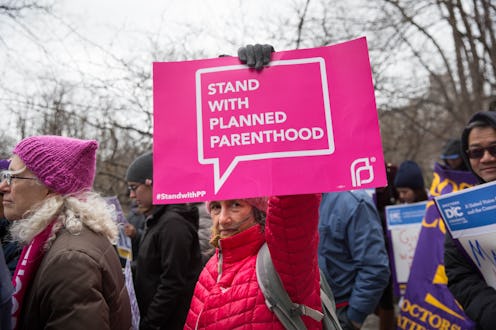It's often said by liberal politicians that reproductive rights are under attack and need to be preserved, but what specific attacks on abortion rights are they referring to? Well, for starters, a law just brought into effect in Louisiana will shut down literally every abortion clinic in the state but one. Yup, that's right: If you want an abortion in Louisiana, there will soon be only one clinic in the entire state that you'll able to get one from, no matter how far away from it you may live. And Louisiana isn't a tiny state where you can just hop on over to the next town with ease.
The law, which only allows physicians with admitting privileges at a hospital within 30 miles of an abortion clinic to give abortions, was first passed in 2014. Since it was highly disputed, District Judge John deGravelles issued a preliminary injunction — which the U.S. Court of Appeals for the Fifth Circuit just reversed, stating that "the plaintiffs had not demonstrated that the law placed an undue burden on a large fraction of women." But given that three of the four abortion providers in Louisiana are about to close due to the law, it's hard to see how a "large fraction of women" would not be impacted.
In case you're tempted to think this is one isolated situation, it's actually one of many laws making it exceedingly and increasingly difficult to obtain abortions in the United States. Here are a few other facts that should leave no doubt that abortion rights are in danger. The right to abortion granted by Roe v Wade should not be taken for granted — because if things continue the way they have been recently, we might very well lose it.
1. 18 To 37 Percent Of Women On Medicaid Give Birth Because They Can't Afford Abortions
Since the Hyde Amendment prevents Medicaid from covering the cost of abortion, at least 18 percent of women on the health plan have given birth because they couldn't pay to terminate their pregnancies, according to estimates by the Guttmacher Institute. These are often some of the poorest women in the country — and the ones with the most trouble supporting their kids (which many government policies also won't help with).
2. Only Half Of The U.S. Population Is Pro-Choice
According to Gallup poll results published in May 2015, 50 percent of Americans identify as pro-choice, while 44 percent are pro-life. This is actually an improvement from the 2012 poll, which indicated that the plurality of Americans were pro-life. This breakdown is especially important given that we're on the eve of an election, and it seems many Americans have no problem voting for anti-choice candidates. Speaking of which...
3. Republican Candidates Have Vowed To Defund Planned Parenthood And Overturn Roe v Wade
All the Republican candidates in the 2016 election have said that they would defund Planned Parenthood, which would close down abortion centers all around the country. And after Supreme Court Justice Antonin Scalia died, Republican candidates took his death as an opportunity to discuss how they'd change court decisions by appointing a new justice. "We are one justice away from a Supreme Court that will strike down every restriction on abortion adopted by the states," Ted Cruz said in the Feb. 13 Republican debate. "We are going to be a country that says that life begins at conception and life is worthy of the protection of our laws," Marco Rubio echoed. While Obama has said he will appoint the next justice, it's clear that if elected, Republicans will do anything in their power to limit abortion rights.
4. You Must Get An Ultrasound Before Getting An Abortion In 25 States
States already make people jump through a number of hurdles before obtaining abortions, including getting ultrasounds and hearing descriptions of the fetuses, according to the Kaiser Institute. 38 states require that women receive counseling before getting an abortion, and 27 of them require the woman to wait 24 hours between the counseling and the abortion, according to the Guttmacher Institute. These may seem like minor requirements, but they can make an already tough decision both logistically complicated and emotionally taxing.
Images: Giphy(4)
